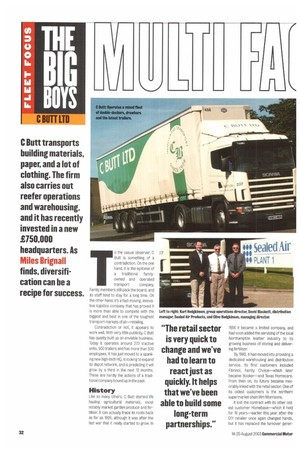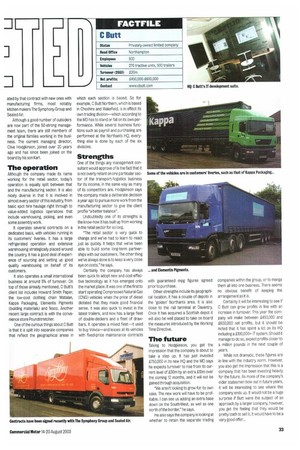T o the casual observer. C Butt is something of a
Page 32

Page 33

If you've noticed an error in this article please click here to report it so we can fix it.
contradiction. On the one hand, it is the epitome of a traditional famlyowned and operated
transport company. Family members still pack the board, and its staff tend to stay for a long time. On the other hand, it's a fast-moving, innovative logistics company that has proved it is more than able to compete with the biggest and best in one of the toughest transport markets of all—retailing.
Contradiction or not, it appears to work well. With very little publicity, C Butt has quietly built up an enviable business. Today it operates around 270 tractive units, 500 trailers and has more than 500 employees. It has just moved to a spanking new high-tech HQ, is looking to expand its depot network, and is predicting it will grow by a third in the next 12 months. These are hardly the actions of a traditional company bound up in the past.
History
Like so many others. C Butt started life hauling agricultural materials, most notably market garden produce and fertiliser. It can actually trace its roots back as far as 1926, although it was after the last war that it really started to grow. In 1956 it became a limited company, and had soon added the servicing of the local Northampton leather industry to its growing business of storing and delivering fertiliser.
By 1980, it had moved into providing a dedicated warehousing and distribution service. Its first customers included Fibrinol, Family Choice—which later became Booker—and Texas Homecare. From then on, its future became inexorably linked with the retail sector. One of its oldest customers is the northern supermarket chain Wm Morrisons.
It lost the contract with its other oldest customer Homebase—which it held for 16 years—earlier this year after the DIY retailer once again changed hands, but it has replaced the turnover gener ated by that contract with new ones with manufacturing firms, most notably kitchen makers The Symphony Group and Sealed Air.
Although a good number of outsiders are now part of the 50-strong management team, there are still members of the original families working in the business. The current managing director, Clive Hodgkinson, joined over 20 years ago and has since been joined on the board by his son Karl.
The operation
Although the company made its name working for the retail sector, today's operation is equally split between that and the manufacturing sector. It is also nicely diverse in that it is involved in almost every sector of this industry, from basic spot hire haulage right through to value-added logistics operations that include warehousing, picking, and even some assembly work.
It operates several contracts on a dedicated basis, with vehicles running in its customers' liveries. It has a large refrigerated operation and extensive warehousing strategically placed around the country. It has a good deal of experience of sourcing and setting up good quality warehousing on behalf of its customers.
It also operates a small international business at around 5% of turnover. On top of those already mentioned, C Butt's client list includes Howard Smith Paper, the low-cost clothing chain MateIan, Kappa Packaging, Elementis Pigments (building materials) and Tesco. Another recent large contract is with the convenience store Poundstretcher.
One of the curious things about C Butt is that it is split into separate companies that reflect the geographical areas in
which each section is based. So for example, C Butt Northern, which is based in Cheshire and Wakefield, is in effect its own trading division—which according to the MD has to stand or fall on its own performance. While several business functions such as payroll and purchasing are performed at the Northants HQ, everything else is done by each of the six divisions.
Strengths
One of the things any management consultant would approve of is the fact that it is not overly reliant on one particular sector of the transport/logistics business for its income, in the same way as many of its competitors are. Hodgkinson says the company made a deliberate decision a year ago to pursue more work from the manufacturing sector to give the client profile "a better balance".
Undoubtedly one of its strengths is the know-how it has built up from working in the retail sector for so long.
"The retail sector is very quick to change and we've had to learn to react just as quickly. It helps that we've been able to build some long-term partnerships with our customers. The other thing we've always done is to keep a very close eye on costs," he says.
Certainly the company has always been quick to adopt new and cost-effective technology as it has emerged onto the market place. It was one of the first to start operating Compressed Natural Gas (CNG) vehicles when the price of diesel dictated that they made good financial sense. It was also quick to invest in the latest trailers, and now has a large fleet of double-deckers and a fleet of drawbars. It operates a mixed fleet—it used to buy Volvos—and leases all its vehicles with fixed-price maintenance contracts with guaranteed mpg figures agreed prior to purchase.
Other strengths include its geographical location. It has a couple of depots in the 'golden' Northants area. It is also close to the rail terminal at Daventry. Once it has acquired a Scottish depot it will also be well placed to take on board the measures introduced by the Working Time Directive.
The future
Talking to Hodgkinson, you get the impression that the company is about to take a step up. It has just invested £750,000 in its new HQ and the MD says he expects turnover to rise from its current level of £30m by an extra £10m over the coming 12 months, and it will not be gained through acquisition.
'We aren't looking to grow for its own sake. The new work will have to be profitable. I can see us adding an extra base down on the South-West, as well as one north of the border," he says.
He also says the company is looking at whether to retain the separate trading companies within the group, or to merge them all into one business. There seems no obvious benefit of keeping the arrangement as it is.
Certainly it will be interesting to see if C Butt can grow profits in line with an increase in turnover. This year the company will make between £450,000 and £600,000 net profits, but it should be noted that it has spent a lot on its HQ including a £100,000+ IT system. Should it manage to do so, expect profits closer to a million pounds in the next couple of years.
While not dramatic, these figures are in line with the industry norm. However, you also get the impression that this is a company that has been investing heavily for the future. As more of the company's elder statesmen bow out in future years, it will be interesting to see where this company ends up. It would not be a huge surprise if Butt were the subject of an approach by a larger company, however, you get the feeling that they would be pretty loath to sell it. It would have to be a very good offer...
































































































































































